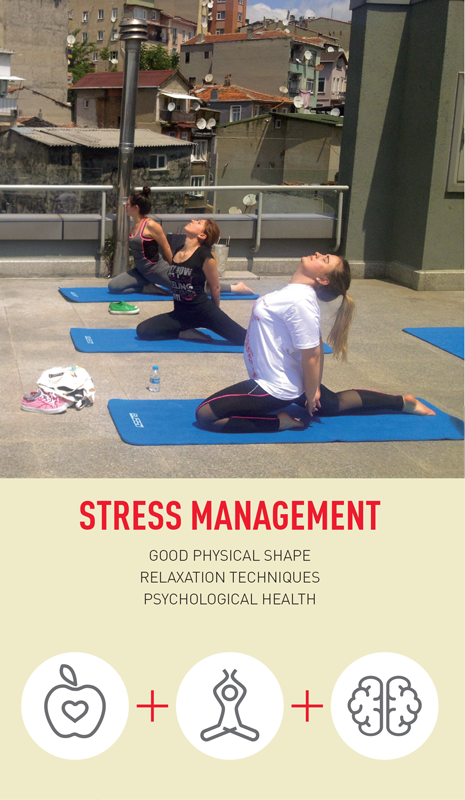Fortunately, nowadays we seldom face mortaldangers… but our body continues to deploy the same responses that enabled primitive human beings to activate their reaction system in the face of some threat (usually of death). In evolutionary terms, stress and its complex mechanism signified the survival of our species, as they enabled humans to adapt better to their environment.
TEXT CORPORATE HUMAN RESOURCES AREA | PHOTOS Thinkstock
Broadly speaking, stress is the primitive response of an organism to some danger. It is a physiological reaction involving a series of associated physical symptoms which, essentially, are designed to prepare the individual for a fight or flight response.
The stress response was perpetuated in the human species because the individual with the most perfected system for reacting to danger was the one most likely to survive and reproduce.
How long have we known about stress?
Stress has always existed, but the first studies on stress were conducted by Hans Selye (1907-1982), who published his most famous research work in 1950: “Stress, a study of anxiety”.
Selye described a whole series of psychophysiological symptoms he witnessed in his patients, regardless of the disease they were suffering from and he called it the “just being sick syndrome”. He observed that his patients were suffering from physical disorders that were not directly caused by their disease. Broadly speaking, these symptoms consisted of fatigue, alterations of appetite, changes in weight, asthenia, etc. Thus he ended up defining stress as a “nonspecific body response to any demand placed upon it, whenever this demand exceeds available resources”. This definition remains valid today.
What physical processes accompany the stress reaction?
Selye suspected that there was some mechanism in the body that responded in a general way to the external “noxious agents”. He soon came to the conclusion that this mechanism was controlled by the relationship between the hypothalamus, the hypophysis (pituitary gland) and the adrenal glands.
This is what is currently known as the hypothalamic-pituitary-adrenal axis (HPA axis). This is a neuroendocrine system whereby, depending on the stimuli perceived by the body, substances are released that trigger certain reactions.
The interactions between these three organs control reactions to stress and also regulate many body processes such as the digestion, immune system, emotions, sexual behavior and energy metabolism.
Many organisms, from humans right down to the simplest forms, share components of the HPA axis. This mechanism and its series of interactions between glands, hormones and parts of the brain are responsible for the symptoms that accompany stress.
The physical consequences of the permanent activation of this axis may frequently give rise to digestive problems, diminished cognitive capacity, the appearance of more, higher intensity diseases (as a result of an altered immune system), contractures and muscle

Can stress be eliminated?
This is not possible, nor is it desirable. The key is to manage it, as we have seen that stress is the automatic, natural response of our body to situations that appear threatening or challenging to us.
Life and our environment, in constant flux, result in our being frequently faced with situations that pose a risk or a challenge, and, therefore, call for continuous adaptations. For this reason, experiencing a certain amount of stress or activation is necessary and, indeed, beneficial.
The problem occurs when the stress response (activation of the HPA axis) continues over some time and becomes almost permanent, as the body can become exhausted and sick, as well as being unable to successfully deal with the demands of the environment. This is when we need to act in order to control this set of symptoms and thus be able to manage our stress.
In short, what is needed to successfully tackle everyday demands is an “ON/OFF button” for our HPA axis. We can thus manage the symptoms at the moment they start appearing and take advantage of the positive qualities of the activation of this complex process. In this fashion, if we can successfully manage our stress, we will be increasing our RESILIENCE.
What do we mean by resilience?
Imagine for a moment the ability of the reeds to bend without breaking or suffering damage when battered by a fierce gust of wind. A tree may appear to be stronger, but it will surely break long before the reeds in the face of a strong wind. This simple metaphor makes it easy to understand what we are referring to here. Resilience is the ability of human beings to overcome adverse events and be capable of successfully completing tasks despite prevailing negative circumstances. When people handle their stress properly, this increases their resilience and they are more likely to be successful in their interactions with their environment (labor, personal, partner, etc.).
How can stress be managed?
We have already seen that:
• Stress is not only a psychological process, but rather it is also a set of physical symptoms a body experiences in the face of an excessive demand from its surroundings.
• We cannot – and nor should we – endeavor to completely eliminate stress, because this is what enables us to respond to problems or challenges we come up against.
• The probability of success in some completely new, difficult situation – in short, “stressful” – is directly related to our ability to “switch off”, to be more resilient.
How can we achieve this?
Knowledge of the above premises is just as important as acquiring new habits and ways of thinking. To do this, all that is needed is practice.
Practice some relaxation technique: doing this regularly and consistently enables us to become relaxed in just a few minutes. There are a great many relaxation techniques. Almost all, or at least the most effective, are based on controlling our breathing and being aware of our musculature and physical sensations. Daily practice is highly recommended, especially to be able to successfully impede the activation of the HPA axis and restore equilibrium. This may be the “key” we were looking for.
Improve and/or maintain your physical fitness: a healthy diet, together with regular physical exercise, is an infallible recipe for avoiding a multitude of problems. It is also effective for managing stress, given that feeling better physically makes it easier to cope with difficult situations.
Improve and/or maintain your psychological health: we are referring here to a very broad concept, sometimes difficult to deal with by yourself. Today it finally seems to be widely accepted that, in the same way as you consult with your physician about health problems, you sometimes need the help of a psychologist to deal successfully with situations that may prove somewhat more complicated. When it comes to successfully dealing with stress, it is essential to be able to call on resources such as assertiveness, organizational capacity, maintenance of realistic expectations, appropriate expression of emotions, etc.
More information in the global intranet




